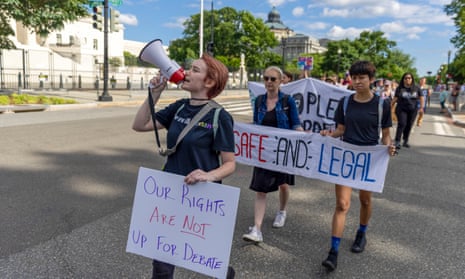A group of Austin, Texas, city council members is preparing a resolution to “decriminalize” abortion there in the event the US supreme court overturns Roe v Wade, a landmark case decided nearly five decades ago that protects the federal right to terminate a pregnancy.
An unprecedented leaked supreme court draft decision showed a conservative majority of the nine justices are open to reversing Roe v Wade entirely. If that happened, 26 states would be certain or likely to ban abortion, including in Texas. The state has a “trigger” ban that would almost immediately ban abortion.
A final supreme court decision is expected in June.
“The resolution does two things – one, [it] restricts city funds from being used to essentially investigate any kind of alleged abortion crimes,” said José “Chito” Vela, an Austin councilman. “The other thing it does is to make the investigation of any abortion-related crime the lowest priority for our police department.”
The resolution seeks to protect patients and medical professionals from criminal prosecution and would also advise Austin police not to assist other law enforcement, such as state police, in such investigations.
Texas has already proven to be a legal pioneer in restricting abortion. The state banned abortion after six weeks gestation, before most women know they are pregnant, through a novel law that allows citizens to sue anyone, anywhere who “aids or abets” a woman in terminating a pregnancy.
“We need them focusing on historically classic criminal activity – not politically disfavored groups that factions in the government want to harass and punish,” said Vela. “That’s the real core of what we’re trying to do.”
Mainstream anti-abortion groups have long argued they oppose prosecution of women and cast women as victims of abortion providers. Similarly in Texas, the trigger ban would make the performing of an abortion a first-degree felony punishable by up to 99 years in prison, an article likely to have a impact on medical providers.
However, a vocal minority of abortion “abolitionists”, a word appropriated from anti-slavery campaigners, have also recently pushed lawmakers to classify abortion as murder.
In May, Louisiana lawmakers considered a bill to charge women who have abortions with homicide. “We all know that it is actually very simple – abortion is murder,” one of the bill’s supporters, state representative Danny McCormicktold colleagues, according to CBS News. The bill was pulled after it failed 65-26.
Although many anti-abortion groups say they oppose prosecution of women, anti-abortion restrictions and rhetoric have nevertheless resulted in more than 1,600 instances of women since 1973 being, “arrested, prosecuted, convicted, detained, or forced to undergo medical interventions that would not have occurred but for their status as pregnant persons,” National Advocates for Pregnant Women said in a recent brief to the supreme court.
At least one recent, high-profile example from Texas, 26-year-old woman Lizelle Herrera was charged with murder via “self-induced abortion”, a criminal statute that does not appear to exist. Charges were dropped after public outcry. The prosecutor apologized.
Austin’s Guarding the Right to Abortion Care for Everyone or “Grace” Act is still in draft form, and text is not expected to be immediately released. Vela said the council would probably consider the act after the supreme court releases its final decision in the highly anticipated abortion case.
It is a case out of Mississippi, formally called Dobbs v Jackson Women’s Health Organization, in which the southern state has argued that the court should use the case to overturn Roe.
“Whatever your thoughts on abortion, criminal prosecution of women who have abortions is absolutely unacceptable and abuse by the criminal justice system,” said Vela.
